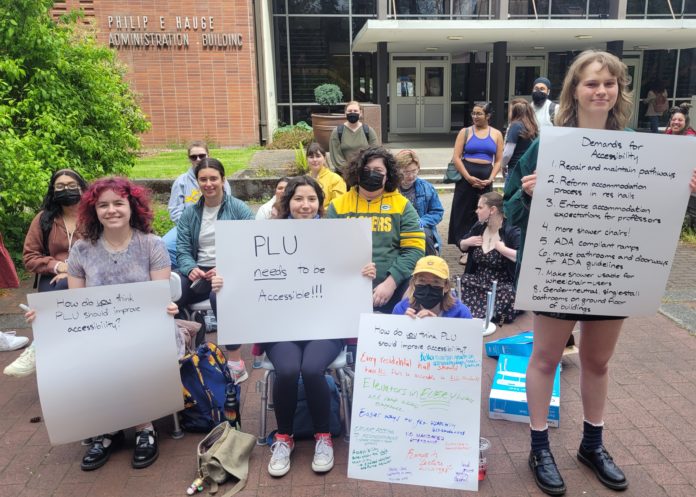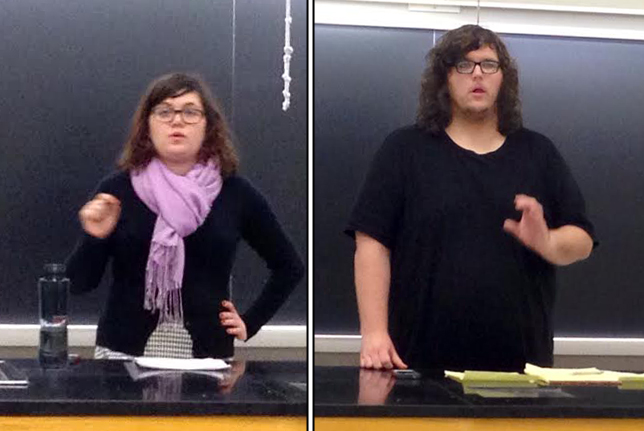
Nolan James
Editor-In-Chief
On a sunny day at the end of last school year at PLU, a group of students gathered outside of the Hauge Administration Building to protest a lack of accessibility for disabled students. The protest was organized by three students: Sage Warner and Joyce Lee of PLU’s student government ASPLU (which the event was not affiliated with) and Bella Schneider.
The protest came about after Schneider and Warner met with PLU President Allan Belton to discuss improving access on campus for disabled students. Their conversation with Belton included a number of ideas they had for improving the school’s policies regarding disabled people.
“The ideas that we had were based on conversations with school staff and students as well, because I spoke to quite a few students who had their own personal complaints, and some of them ended up actually leaving PLU because of that, and they wanted things to be improved, but it was just something that they couldn’t deal with anymore,” Warner said.
Some of their suggestions include getting shower chairs and ramps available to every residence hall, and to improve maintenance of pathways, which can become impossible for wheelchair-bound students to navigate during harsher climates.
“There are issues where, if it snows on campus—which causes everything to shut down in general—if they shovel the snow, sometimes it will end up just piled up around the buttons to open doors,” Warner said.
Schneider pointed out that “it’s actually physically impossible for someone who is wheelchair-bound to live in several of our residence halls,” and criticized PLU’s lack of transparency in that regard.
“The fact that our campus touts itself as a welcoming environment to all completely erases the struggle of an entire community of people who use mobility aids and who need accommodations, and they just are not given a safe environment in which to live.”
According to Warner, Belton made a lot of promises for things he was going to do. “He promised to speak to Austin Beiermann, who’s the new person in charge of Accessibility and Accommodations the past year,” Warner said shortly after the protest. “We were also talking about the physical accommodations for people, in terms of like shower chairs, and he said he would talk to Tom Huelsbeck. It’s a situation where these are employees of the school who do not live on campus, so they don’t really know the situation of what is going on inside of res halls.”
According to Warner, after speaking with Beireman and Huelsbeck a while later, neither of them had heard a word from Belton regarding Warner and Schneider’s meeting with him. “That’s when we felt like it was necessary to have a protest, to try and get the attention of the school to a greater degree,” Warner said. Lee offered Warner and Schneider her help, and the protest commenced from there.
For the protest, Warner bought some shower chairs from out of their pocket, and a few more were donated. Shower chairs are one of the primary forms of accessibility the group wishes to implement at PLU.
“Shower chairs cost like 50 dollars, so it’s ridiculous that the school doesn’t provide them in every residence hall,” Warner said. “Everyone at some point in their lives are probably going to be disabled, like if you sprain your ankle, or if you are tired, and you may want to sit in a chair.”
The chairs were brought to the protest where students could sit in front of the main building, while many more crowded around discussing their experiences with accessibility in the school. Warner and Schneider held up large white posters listing their demands, which students could add to. One of those students, Megan Johnson, turned her attention to learning disabilities.
“I wrote to allow accommodations to carry over for each course and semester,” Johnson said. “Currently how it is, you have to apply your accommodations to each course you take for every single semester, and for people like me who have a really hard time with that, or with remembering, it’s a very difficult thing to do. Even though you have accommodations, if you don’t apply for them for each course, you don’t get them.”
Many students passing by on their way to classes voiced their support, as well as multiple staff members. According to Warner, after the event, a large number of faculty were talking about it, and so the group felt the event successfully brought the kind of attention they wanted it to.
When asked via email if he had been in contact with Belton since the protest, Huelsbeck replied, “Yes, we’ve communicated around these same goals.” He added that he appreciated the conversations he has had with Warner, as well as other students who have reached out to him about better accessibility. “Ultimately, I feel like we are working toward the same goals,” he said.
Austin Beiermann, who was also reached out to via email, said, “Regarding improving accessibility in general: The Office of Accessibility and Accommodation Resources has and will continue to serve students by providing access to accommodations. If students have specific needs, they can always reach out to me directly at beiermad@plu.edu and I am glad to assist.” He then mentioned a project that he and Brenda Llewellyn Ihssen, Associate Professor of Early and Medieval Christian History, and Vanessa Tucker, Associate Professor of Education, have been working on to improve accessibility in the classroom.
“One project that we are working on this year to expand accessibility in the classroom is a pilot project,” he said. The goal of the project is “to help faculty incorporate Universal Design Principles in their courses.” Universal Design is the idea that better accessibility should be provided to all students, and that everyone is treated as if they need accommodations.
One of Warner’s primary goals is having Universal Design implemented in all PLU classrooms. “Things that are meant for disabled students can benefit everyone, like in classrooms you can get special accommodations to have a later deadline or to get extra test time, and in this case it would just be that everyone automatically gets that,” they said. “It’s the setup where you don’t need to ask for anything, it’s just already provided.”
The Mast recently emailed Belton about the protest and received a written response. “I was unaware of the gathering, but I was informed shortly afterward,” he said. “I’m grateful to these students for using their time and voices to advocate for a more accessible campus for all of our community members and for the valuable feedback they have provided.”
Belton mentioned the pilot program to implement Universal Design in Llewellyn Ihssen and Tucker’s classrooms, as well as progress the school is making to improve accessibility in restrooms across campus. “All-gender, single-stall restrooms are a concern. We are currently working with the Trans Task Force and Facilities Management to review more spaces for all-gender restrooms.” He mentioned all-gender bathrooms being built in the Names Fitness Center, the Hauge Administration Building and the newly-renovated School of Nursing Clinical Learning and Simulation Center.
“I look forward to continuing the work of improving accessibility across campus with the university’s leadership team in the new academic year,” Belton said, “and I appreciate the student perspective provided as an essential lens and tool for helping us prioritize our work.”
More information about university services currently provided through the Office of Accessibility and Accommodation can be found online at plu.edu/oaa/

















